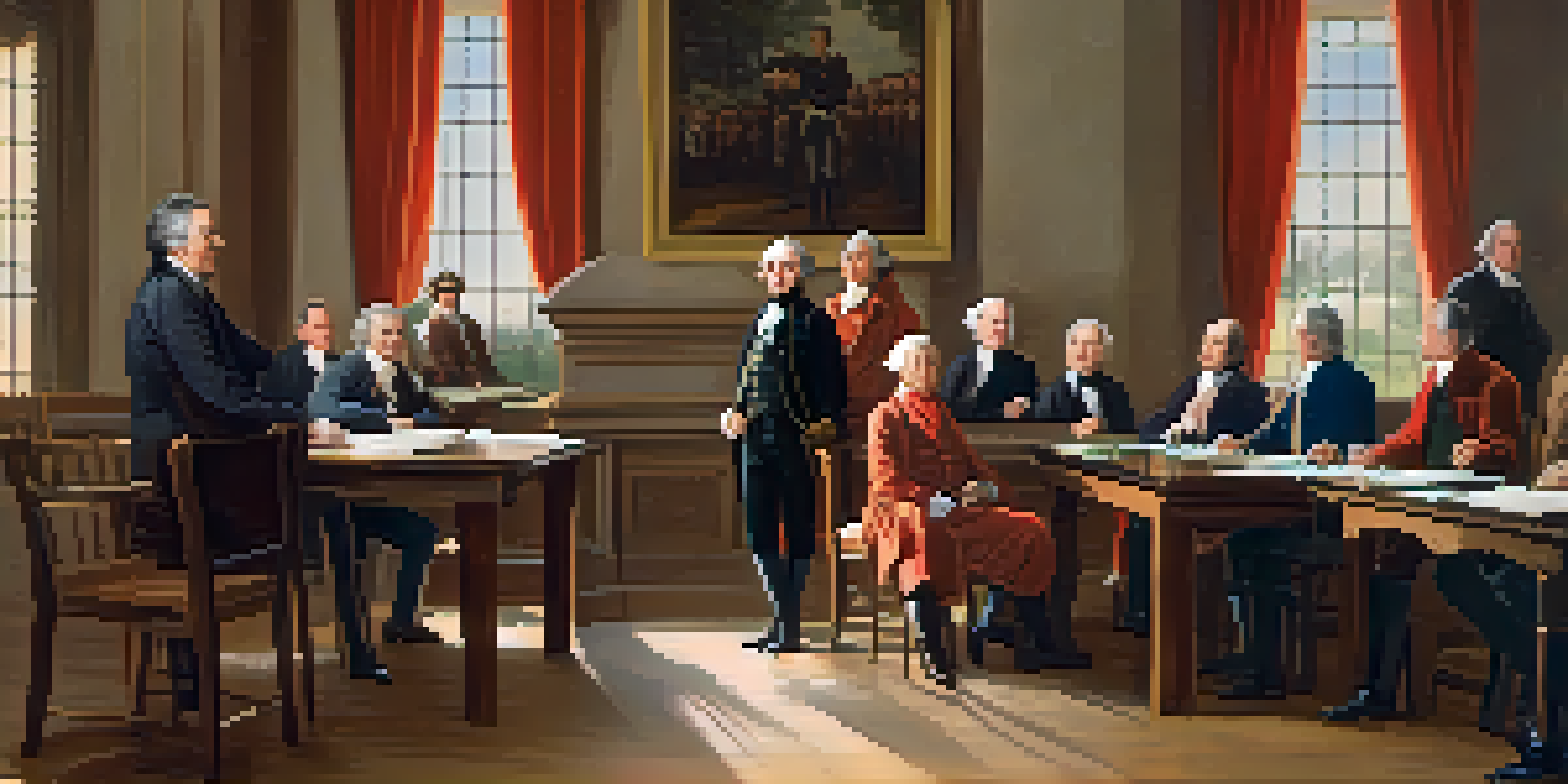Tennessee's Political History: Key Leaders and Milestones

Early Political Foundations: The 18th Century
Tennessee's political history began in the late 18th century with its transition from frontier territory to statehood. Originally part of North Carolina, the region sought independence to better govern its unique needs. In 1796, Tennessee became the 16th state, marking a significant milestone in its political evolution.
The arc of the moral universe is long, but it bends toward justice.
The early leaders were largely self-taught politicians who valued individualism and local governance. Figures like John Sevier emerged, advocating for a strong sense of community and autonomy. Such leaders laid the groundwork for Tennessee’s distinctive political culture, emphasizing the importance of local issues.
This period also saw the establishment of early political parties, primarily the Democratic-Republicans, who were influential in shaping the state's governance. Their focus on agrarian interests reflected the values of the population, setting a tone for future political developments in Tennessee.
The Civil War: A Divided State
Tennessee's political landscape was deeply affected by the Civil War, with the state being a battleground for both Union and Confederate forces. The state initially sided with the Confederacy, which led to internal strife and division among its citizens. This conflict highlighted the complexities of Southern loyalty and the personal struggles of many Tennesseans.

Key leaders emerged during this tumultuous time, including Governor Isham Harris, who staunchly supported the Confederacy. However, many Tennesseans opposed secession, leading to a unique situation where the state was divided in loyalty. This division would have lasting effects on Tennessee's political dynamics, even post-war.
Tennessee's Political Evolution
Tennessee transitioned from a frontier territory to the 16th state, establishing a political culture centered on individualism and local governance.
After the war, Tennessee was the first state to be readmitted to the Union, which allowed it to rebuild and redefine its political identity. The post-war era saw a struggle for power between various factions, including former Confederates and newly freed African Americans, which shaped the state's future.
Reconstruction and Political Realignment
The Reconstruction era was a pivotal time for Tennessee, as it sought to rebuild its society and political systems. Under federal supervision, the state faced significant challenges, including integrating newly freed slaves into the political fabric. This period required a delicate balance between old Southern values and the new realities of a diverse population.
Injustice anywhere is a threat to justice everywhere.
During this time, leaders like William G. Brownlow emerged, advocating for rights and reforms that aimed to improve the lives of African Americans. His tenure as governor was marked by efforts to promote education and civil rights, highlighting the potential for a more inclusive political landscape. However, resistance from traditionalists often thwarted these efforts.
The rise of the Ku Klux Klan during Reconstruction further complicated the political environment, instilling fear and violence against those who supported African American rights. The tensions of this era set the stage for the long-lasting struggles for civil rights in Tennessee and the broader South.
20th Century Shifts: Progressivism and Change
As the 20th century unfolded, Tennessee experienced significant political changes driven by the Progressive movement. Leaders like Governor Austin Peay pushed for reforms in education, labor, and government transparency. These efforts aimed to modernize Tennessee and respond to the challenges posed by industrialization and urbanization.
The rise of influential figures, such as Cordell Hull, who served as Secretary of State under Franklin D. Roosevelt, showcased Tennessee's increasing impact on national politics. Hull's contributions to international diplomacy emphasized the state's evolving role in both state and federal governance. His legacy is a testament to the importance of Tennessee in shaping broader political narratives.
Civil Rights Movement Impact
Tennessee played a pivotal role in the Civil Rights Movement, with key figures advocating for equality and peaceful protests shaping national dialogue.
However, this era was not without its struggles, as conflicts over civil rights and economic disparities continued to challenge Tennessee's political landscape. The struggle for labor rights and the push for equality reflected the ongoing quest for social justice that would characterize the latter half of the century.
Civil Rights Movement: Leaders and Legacies
The Civil Rights Movement marked a crucial chapter in Tennessee's political history, with leaders emerging to challenge segregation and advocate for equality. Figures like Diane Nash and John Lewis played instrumental roles in organizing protests and sit-ins, making Nashville a focal point for civil rights activism. Their courage and determination inspired countless others across the nation.
Tennessee was also home to significant events, such as the Nashville sit-ins in 1960, which aimed to desegregate lunch counters. These peaceful protests demonstrated the power of nonviolent resistance and drew national attention to the struggle for civil rights. The collaboration among diverse groups highlighted a united front against injustice.
The assassination of Dr. Martin Luther King Jr. in Memphis in 1968 further underscored the urgency of the movement. His legacy continues to resonate, reminding us of the sacrifices made in the pursuit of equality. Tennessee's role in the Civil Rights Movement not only shaped its political landscape but also contributed significantly to the national dialogue on race and justice.
Modern Political Landscape: Challenges and Triumphs
In recent decades, Tennessee's political scene has been characterized by both challenges and triumphs, reflecting broader national trends. The state has seen a shift towards conservative governance, with Republican leaders dominating the political landscape. This shift has sparked debates over issues such as education, healthcare, and taxation, shaping the lives of Tennesseans.
Despite the predominance of conservative politics, Tennessee has also seen progressive movements gaining traction, particularly in urban areas like Nashville and Memphis. Activism around issues like gun control, environmental policy, and social justice indicates a vibrant political discourse. These movements remind us that Tennessee's political identity is not monolithic but rather a tapestry of diverse perspectives.
Modern Political Landscape
Today's Tennessee faces a blend of conservative governance and progressive activism, reflecting a diverse political discourse amidst ongoing social challenges.
The ongoing discussions about race, equity, and representation continue to challenge Tennessee's leaders. As the state navigates these complex issues, the legacy of past leaders and movements serves as a guide for future progress. Understanding this modern landscape requires an appreciation for the historical context that has shaped it.
Looking Ahead: The Future of Tennessee Politics
As Tennessee moves forward, its political future remains uncertain yet full of potential. The state is experiencing demographic changes, with an influx of younger voters and diverse populations. This shift presents opportunities for new voices to emerge and influence the political dialogue, potentially reshaping the state's priorities.
Issues such as healthcare access, education reform, and climate change are likely to dominate future political discussions. As Tennesseans engage with these challenges, the lessons learned from past leaders and movements will be crucial. The ability to listen to diverse perspectives and work collaboratively will be key to finding effective solutions.

Ultimately, Tennessee's political history is a story of resilience, adaptation, and the ongoing quest for justice and equality. By reflecting on the milestones and key leaders who have shaped its journey, the state can continue to evolve and meet the needs of all its citizens in the years to come.